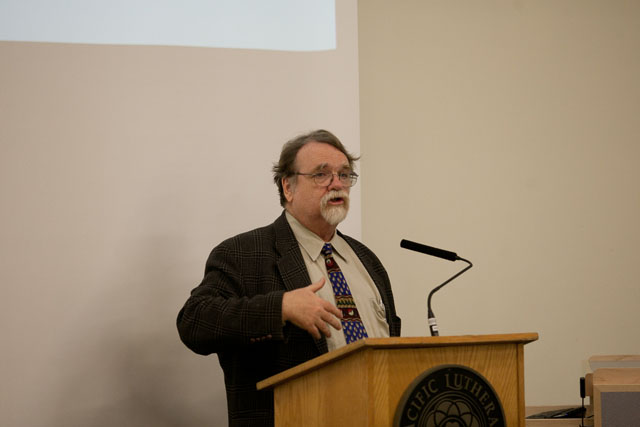Page 20 • (757 results in 0.036 seconds)
-
workers. This resource will help them talk about different topics relating to terminal illness. To be a part of this research you must have experience with a family member or friend with a terminal illness (past or present). We would like to hear your thoughts in an in-depth interview. The interview will take between 30-60 minutes. For more information, or to express an intent to take part, email Sarah Cornell-Maier at cornelsm@plu.edu. Care Workers of Terminally Ill Patients We are a student-faculty
-

writing at PLU from 1980 to 2014. Although trained as a medievalist, she taught a broad range of literature, from Homer’s Iliad through Margaret Atwood’s The Handmaid’s Tale and Doris Lessing’s The Cleft. While teaching research and writing as well as advanced composition, her real attention was devoted to first-year writing seminars, on such topics as “Mothers and Daughters,” “Women and the Beauty Myth,” and “Barbie, Bratz, and Bella: The Construction of Girlhood in the Twenty-First Century.” Over
Contact Information -
will be awarded a $750 prize; the second-place award will be $250. Essays should reflect Raphael Lemkin’s ideals and concerns to include such topics as the concept and definition of genocide, ethical and legal aspects of genocide and international law, prevention of genocide and enforcement of the genocide convention, historical incidents of genocide, current events and the issue of genocide or other appropriate essay topics discussed and negotiated between contestants and the faculty review
-
on the topic of genocide. A panel of faculty members will judge the essays. The first-place essay writer will be awarded a $750 prize; the second-place award will be $250. Essays should reflect Raphael Lemkin’s ideals and concerns to include such topics as the concept and definition of genocide, ethical and legal aspects of genocide and international law, prevention of genocide and enforcement of the genocide convention, historical incidents of genocide, current events and the issue of genocide
-
highlighted the talents of the students, faculty and alumni in the communication, art, music and theater departments. “We hope all of the events and all of the speakers attract a wide range of students,” said Sabrina Coady, co-chair of the planning committee. In the past, the event targeted only students and featured several speakers focused on communication and theater topics. This year, event organizers opted to reach out to both PLU and the surrounding community and encouraged alumni to attend. “PLU is
-

community during the two-day Food Symposium presented by the Philosophy Department last week. The symposium began with a series of sessions for the symposium’s presenters on Feb. 20. They started the morning with a discussion on a variety of food topics, including organic agriculture and food system sustainability, supporting local farmers and achieving changes in the food system, and food costs. Among the presenters was an array of PLU students, staff, and professors, and community members, with a
-
structural racism and objects. That event was set up as a talk with a Q&A session. And then we had another event entitled “Strategies for Talking Across Divides.” We also had a conversation entitled “Outrage and Deliberation” in May 2018. Dr. Rings: “Patriotism: Vice or Virtue?” was another event we hosted. At SOPHIA events we like to discuss topics that are going to make people think, topics that will evoke strong viewpoints or burning questions. Even if it’s uncomfortable! We want to take things in
-
: Script Analysis (4) or THEA 345: Playwriting (4) 18 semester hours from: THEA 252: Fundamentals of Scenic Design (4) THEA 254: Fundamentals of Lighting Design (4) THEA 275: Scenic Painting: Techniques (2) THEA 276: Scenic Painting: Textures (2) THEA 285: Costume Crafts and Construction (4) THEA 351: Stage Makeup (4) THEA 355: Lighting Design (4) THEA 388: Special Topics in Theatre (2) THEA 389: Special Topics in Theatre (2) THEA 390: Visual History: Period Costume and Décor (4) THEA 453: Costume
-
You Ask. We Answer. How is your Psychology Program? Posted by: mhines / April 6, 2024 April 6, 2024 What types and topics of undergraduate research do 100 percent of PLU psychology students participate in? Dr. Michelle Ceynar, Professor of Psychology, answers these questions and more during this session! RELATED: Want to check out the psychology major in less than a minute? View our Pschyology Major Minute with Associate Professor of Psychology Laura A. Shneidman. Read Previous You Ask. We
-
TECBio REU at University of Pittsburgh Posted by: nicolacs / December 11, 2019 December 11, 2019 Summer Research in Computational Biology at the University of Pittsburgh Students will receive classroom training in topics pertinent to the emerging field of computational biology, such as computational structural biology, cell and systems modeling, computational genomics, and bioimage informatics, in addition to a wide variety of theoretical and experimental research projects. Students will
Do you have any feedback for us? If so, feel free to use our Feedback Form.


